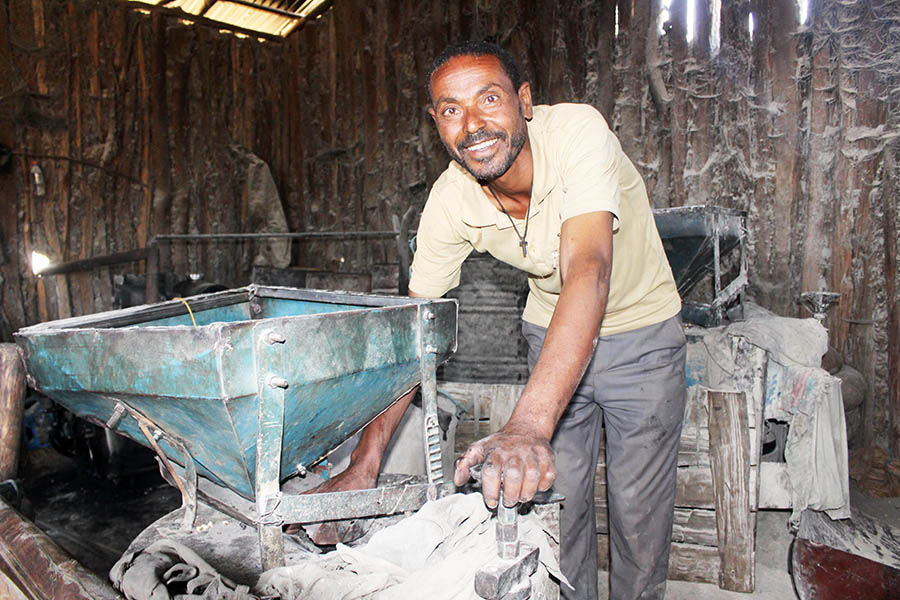DEVELOPING ALTERNATIVES
Land Titles in Ethiopia Open Doors to Finance and Investment
Nov 7, 2018
While still one of the poorest countries in the world, Ethiopia has made major advances in reducing poverty and increasing agricultural production in recent years. However, the pace of progress is constrained by inefficiencies in the rural land sector, including weak documentation and management of land rights.
Land Investment for Transformation (LIFT), a U.K. Department for International Development (DFID) programme, is tackling this issue with a unique approach—by using a market systems lens. And the benefits of this approach are beginning to bear fruit.
LIFT supports the Government of Ethiopia’s efforts in rural land certification to drive investment, increase productive land use, and boost the incomes of rural households. The market systems approach addresses constraints that prevent farmers from increasing their productivity. Covering 14 million parcels of land across Ethiopia’s four highland regions, LIFT is the single largest land governance project in DFID’s portfolio and one of the largest in terms of budget and scale of operation funded by any donor globally.
Opening New Doors
The confidence that comes with security of tenure opens up new opportunities. For example, LIFT has developed an individual loan product linked to farmers’ land certificates and is working with microfinance institutions (MFIs) to promote it, enabling farmers to access finance that otherwise has been out of reach in rural areas. Annual interest rates for the loans linked to land certificates issued by LIFT are around 15 to 18 percent, compared to up to 21 percent for group loans from MFIs and up to 120 percent for loans from informal money lenders.
Alemneh Bare, a resident of the Womberma district in the Amhara region, is a father of seven young children. Through LIFT, he obtained a land certificate for his 0.75 hectares of land in 2016. Unable to generate enough revenue for his family’s needs from this parcel of land, Bare got a job as a mechanic at a flour mill in the nearest town.
In February 2017, he used his land certificate to obtain a 50,000 Ethiopian birr (around £1,400) loan from the Amhara Credit and Savings Institute. Using the loan and existing savings, Bare was able to purchase two diesel-operated flour mills and establish his own milling business. “I am excited to be self-employed, owning and operating my own enterprise,” he said. “My long-term dream has become a tangible reality.”

Bare’s business plan is based on meeting the high demand for milling services to neighboring communities. The mill currently offers employment to both him and his spouse. The business is running well, with daily revenue of 1,000 birr (around £28) and an average net profit of 5,000 birr per month (around £140). As a result, taking care of his children and paying school tuition fees is no longer a daunting challenge for him and his wife.
Bare is confident that he will repay his loan without much difficulty, as his investment has already started to pay off. His future plans are to increase his savings and, upon repaying the first loan, to apply for an additional loan to expand and improve his milling operation, as well as engage in dairy farming and cattle fattening.
Bare’s is one of more than 7,600 loans that have been disbursed through September, worth 222.5 million birr (more than £6 million). At the same time, the loans have allowed the MFIs to leverage more than 21 million birr (around £600,000) in savings, thus increasing their liquidity and allowing them to issue more loans. The MFIs have told the project team they are so happy with this loan product that they are introducing it to non-programme areas, using other land certificates as guarantees—a great example of MFIs expanding and adapting the loan product independently of LIFT.
LIFT’s other interventions in the rural land market include developing a standard land rental contract and establishing a network of land rental service providers that can facilitate land rental agreements, thus allowing landholders to access a formalized and secure land rental market. To date, more than 430 land rental service providers have facilitated and formally registered nearly 12,000 rental contracts. LIFT estimates that more than 40 percent of people who rent out land are women, often from female-headed households, who are unable to work all of the parcels they hold. Renting out land gives them additional income, and the standard contract and formalization of the agreement offers them security and peace of mind.
Land Registration at Scale
LIFT combines a systematic high-volume strategy to the registering of land parcels with the market systems approach. This combination accelerates and magnifies the impact of improved security of tenure.
As of September, roughly 10 million parcels of land have been demarcated by LIFT, with more than 6 million certificates issued and in the hands of farmers. The project aims to register and issue 14 million certificates by 2020, recognizing the rights of all rightful land holders, including men and women in married and unmarried households. By the end of the project, a rural land administration system will be operational in 140 of the nearly 700 districts in Ethiopia.
LIFT’s high-volume approach to land certification has the added advantage of reducing the average cost per parcel certified. To date, LIFT has achieved an average cost per certificate of £3.75, compared with £4.68 in Rwanda and £20.45 in Mozambique.